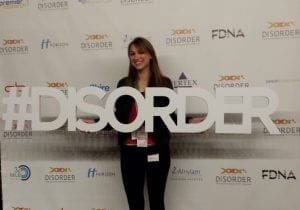The first ever rare disease film festival took place the first week of October in Massachusetts! Founded by rare disease parents Bo Bigelow (USP7 mutation) and Daniel DeFabio (Menkes Disease), this two-day event touched the hearts of all who attended.
Their tagline, “You may never be more moved at the movies,” proved so true — the complimentary tissues were much appreciated by the audience.
The tears were happily interrupted by two heartwarming events during day one of the festival. The audience got to witness the presentation of an incredible, custom-made Magic Wheelchair, and the unveiling of a portrait of baby Purnell via Rare Disease United.
The films showcased during the festival covered multiple disorders and managed to highlight some poignant themes that resonate with the entire rare disease community.
Films like Believe, about those living with Dup15q, Menkes Disease: Finding Help and Hope, and Fragile X in Frame, showed the way that each person, even with the same diagnosis, is different. The disorder may be the same, but the way that it impacts each person and the way that person reacts to treatments can be unique.
These films also showed that despite the differences between rare disorders, rare disease families often share similar stories, such as the delay before diagnosis.
Babies are often not diagnosed until milestones are missed at several months of age. The frustration of not knowing what is wrong is relatable for far too many families. Many are aware that there is something different with their child, but don’t have a name for it, and their normal pediatricians often don’t either. A delay in diagnosis is always a problem, but the risks involved with a late diagnoses varies from disorder to disorder. For example, form Menkes families, a diagnosis past 10 days after birth is often too late to prevent irreversible damage.
Some other recurrent themes across films, across diseases, and across families were:
The Struggle with Medications:
Whether it’s convincing your child to consume a foul tasting mixture and all of it, or trying to find the right balance of treatments in the first place, many rare disease families have experienced similar struggles with medication. Some families felt that the treatment that was necessary to keep their children well, subdued so much of their personalities they didn’t feel that they truly got to know their child.
The Comfort of Others:
The solidarity in the room was palpable as a Dup15q mother stated that support groups saved her sanity, “Those people are family even though you don’t them”.
Other families can provide an incredible, invaluable support system, especially for those who are newly diagnosed. When Bo Bigelow’s family traveled to meet other USP7 families, they finally had the opportunity to shake hands with people who could truly relate to their experiences.
Relationships and Caregiving:
The film Rare In Common” highlighted more similarities in the experiences of rare disease families with non-similar diseases. Those experiences extend out from the biomedical sphere.
It’s more difficult for rare disease families to find babysitters for children who are medically complex. Rare disease can take a toll on relationships when so much time and energy must be allocated to medically necessary tasks. Some parents who have children with genetic disorders may feel guilty, because in a way, they feel like the reason for a disease they wouldn’t wish on anyone.
Support is necessary for not only rare disease patients but caregivers as well. Asking for help from those who don’t fully understand the situation can be difficult. Rare diseases and the daily struggles that they entail aren’t easily explained and many find it hard to illuminate even their own extended family
Tough Questions:
The films, the speakers, and the audience posed and addressed some tough questions and topics. Does compassion for patients fade as the child becomes an adult? How do you handle the stigma surrounding enrolling your child in a residential, full time, special needs services facility? How do families without a diagnosis cope with the lack of support systems? Would you rather a bad diagnosis than no diagnosis? How does one date, with a rare disease?
Michelle Hall, from the film This Is Michelle, spoke about her experiences with EB (epidermolysis bullosa) and the need for more funding for EB research and discussed some hard topics. She advocates for living life fully, but expresses the need to acknowledge not only the physical pain that is often a part of living with a rare disease, but the emotional and financial struggles as well.
She didn’t shy away from pointing out that things like depression and alcoholism can follow in the path of rare diseases. If this isn’t the case for the patient it might be for the parent, feeling helpless in the face of their child’s suffering.
Story Telling:
One stand out lesson from this event and all who participated in it: story telling is important. This event, these films, put faces to disorders. They award glimpses into the everyday lives of extraordinary families. They grant insight to the types of struggles that are endured by so many and they spread awareness in a truly captivating way.

The more stories that are shared the louder rare disease voices are and the stronger the community grows. This event captured the genuine, profound and sometimes humorous aspects of the rare disease experience with an incredible variety of rare represented, the founders and sponsors should be proud.


